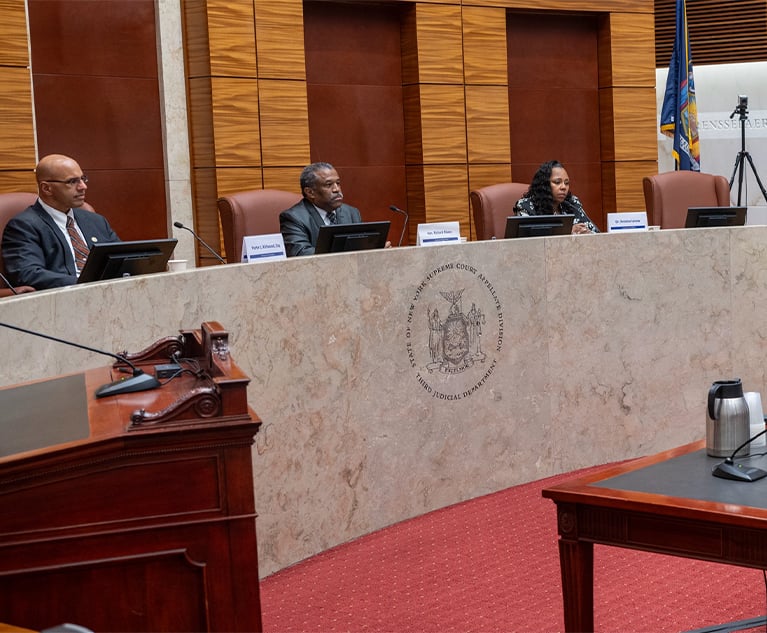Post-Release Placement of Sex Offenders Complicated by Residence Limits, NY Court of Appeals Is Told
Attorneys for Miguel Gonzalez, a level one sex offender, argued before the high court that the state Department of Corrections and Community Supervision deprived him of his freedom by failing to help him find housing far away enough from a school, as is required by law.
October 16, 2018 at 05:06 PM
6 minute read
 Rear of New York State Court of Appeals Building, Albany, New York. Photo by Daniel Case.
Rear of New York State Court of Appeals Building, Albany, New York. Photo by Daniel Case.
The Court of Appeals heard arguments on Tuesday in a case brought by a sex offender who alleged the state did not do enough to help him find appropriate housing before his release from prison, which caused him to be held in state custody for several months after his scheduled release.
Attorneys for Miguel Gonzalez, a level one sex offender, argued before the high court that the state Department of Corrections and Community Supervision deprived him of his freedom by failing to help him find housing far away enough from a school, as is required by law.
Jill Sanders, an associate with Pappalardo & Pappalardo in Westchester County, was counsel to Gonzalez before the high court. Associate Judge Leslie Stein asked Sanders why it was unreasonable for the state to continue holding Gonzalez if he had not found housing compliant with his status as a sex offender.
“Why is it not reasonable to hold him, or anyone, if they haven't met the condition of their release, one of which is to have appropriate housing?” Stein said.
“The condition was impossible. They did not allow him access to the New York City shelter system. He comes from New York,” Sanders said. “He wanted to return to his community.”
Assistant Solicitor General Ester Murdukhayeva argued for the state. She said DOCCS was unable to find Gonzalez housing in Manhattan, where he wanted to return to, because none of the shelters in New York City that would comply with his status as a sex offender had beds open. The state coordinates with the New York City Department of Homeless Services, which said there was no space for Gonzalez at the time, Murdukhayeva said.
Associate Judge Jenny Rivera suggested that DOCCS could have taken Gonzalez to one of the compliant shelters, which could in theory negotiate space for him. Murdukhayeva said there would be no reason to bring Gonzalez to a shelter the city had already said wouldn't take him.
“That negotiation has already happened to the extent DOCCS has been communicating with DHS and DHS has informed DOCCS of the number of beds available,” Murdukhayeva said. “It would be futile to require DOCCS to take individuals when they know what the result is going to be.”
The lawsuit was brought against DOCCS Commissioner Anthony Annucci in 2014 after Gonzalez said he received no help in finding housing compliant with his status as a sex offender leading up to his conditional release date in May 2014. He had earned good time credit of about four months.
The Sexual Assault Reform Act, or SARA, prohibits offenders such as Gonzalez from living within 1,000 feet of a school or other place where children gather. Gonzalez was charged with having sex with a 14-year-old student at a Manhattan school where he worked as a guard and ultimately pleaded guilty to second-degree rape in 2012.
Gonzalez was sentenced to two and a half years in prison at Ulster Correctional Facility, followed by three years of post-release supervision.
When he still had not found SARA-compliant housing by his maximum release date in September 2014, the state transferred him to the Woodbourne Correctional Facility in Sullivan County, which is considered a medium security prison and residential treatment facility, or RTF.
Gonzalez alleged that his experience at Woodbourne was “virtually indistinguishable from continued incarceration in a prison facility,” according to the Appellate Division's decision in the case. He sued the state in December 2014 asking for his immediate release from the facility.
The state argued before the lower courts that without a SARA-compliant residence to be released to, Gonzalez had to be kept in custody at a state-approved RTF such as Woodbourne. The superintendent of the facility said Gonzalez was offered certain employment and programming opportunities that general population inmates were not.
Sanders argued before the high court that the state could have instead transferred Gonzalez to a residential treatment facility in New York City, where he could have been closer to family and services to help him find permanent housing.
“If he had been placed in his community in a compliant residential treatment facility, he would have been able to not only have better help from his parole officer but also be able to help himself by going out and looking for housing, going out and looking for employment,” Sanders said.
Murdukhayeva said it's within the purview of DOCCS to transfer an inmate to whichever facility is best in that situation. She said, at the time, there were not enough resources at facilities in New York City for Gonzalez to be transferred there.
“The reason is programming, staffing, and resource limitations and DOCCS is within its discretion to take those issues into account in deciding where to place somebody,” Murdukhayeva said.
Gonzalez was eventually released to a homeless shelter in Manhattan that complied with the SARA rules in February 2015 while his lawsuit against the state was pending. Albany Supreme Court Justice Judith Hard dismissed his suit as moot because he had been released from the facility, but also said she would have denied his petition on the merits.
The Appellate Division, in a 3-2 split, modified Hard's decision. The court decided that DOCCS had not provided substantial assistance to Gonzalez in find SARA-compliant housing while he was placed at Woodbourne.
“The submissions describing the housing-related efforts made by DOCCS officials during petitioner's placement at Woodbourne make clear that virtually the only 'assistance' offered to petitioner involved waiting for him — then confined in an RTF located within the walls of a medium security prison, without access to the Internet, without the ability to leave the facility to visit libraries, housing offices or potential residences, and with strictly limited access to telephone and correspondence privileges — to identify potential residences and to then investigate his proposals,” the appellate court said.
The Court of Appeals will now be tasked with deciding whether DOCCS provided enough assistance to Gonzalez in finding housing before his release or if the state agency erred and should be doing more to help sex offenders locate compliant housing.
A decision in the case will likely come down in November.
READ MORE:
NY Court of Appeals to Weigh Expert Opinion Linking Asbestos, Mesothelioma
Court of Appeals Rejects James' Appeal Over Authority to Sue as NYC Public Advocate
Court of Appeals Examines Conditions for Funding of Charter Schools Pre-K
This content has been archived. It is available through our partners, LexisNexis® and Bloomberg Law.
To view this content, please continue to their sites.
Not a Lexis Subscriber?
Subscribe Now
Not a Bloomberg Law Subscriber?
Subscribe Now
NOT FOR REPRINT
© 2025 ALM Global, LLC, All Rights Reserved. Request academic re-use from www.copyright.com. All other uses, submit a request to [email protected]. For more information visit Asset & Logo Licensing.
You Might Like
View All

Law Firms Expand Scope of Immigration Expertise Amid Blitz of Trump Orders
6 minute read
'Reluctant to Trust'?: NY Courts Continue to Grapple With Complexities of Jury Diversity
Trending Stories
- 1Uber Files RICO Suit Against Plaintiff-Side Firms Alleging Fraudulent Injury Claims
- 2The Law Firm Disrupted: Scrutinizing the Elephant More Than the Mouse
- 3Inherent Diminished Value Damages Unavailable to 3rd-Party Claimants, Court Says
- 4Pa. Defense Firm Sued by Client Over Ex-Eagles Player's $43.5M Med Mal Win
- 5Losses Mount at Morris Manning, but Departing Ex-Chair Stays Bullish About His Old Firm's Future
Who Got The Work
J. Brugh Lower of Gibbons has entered an appearance for industrial equipment supplier Devco Corporation in a pending trademark infringement lawsuit. The suit, accusing the defendant of selling knock-off Graco products, was filed Dec. 18 in New Jersey District Court by Rivkin Radler on behalf of Graco Inc. and Graco Minnesota. The case, assigned to U.S. District Judge Zahid N. Quraishi, is 3:24-cv-11294, Graco Inc. et al v. Devco Corporation.
Who Got The Work
Rebecca Maller-Stein and Kent A. Yalowitz of Arnold & Porter Kaye Scholer have entered their appearances for Hanaco Venture Capital and its executives, Lior Prosor and David Frankel, in a pending securities lawsuit. The action, filed on Dec. 24 in New York Southern District Court by Zell, Aron & Co. on behalf of Goldeneye Advisors, accuses the defendants of negligently and fraudulently managing the plaintiff's $1 million investment. The case, assigned to U.S. District Judge Vernon S. Broderick, is 1:24-cv-09918, Goldeneye Advisors, LLC v. Hanaco Venture Capital, Ltd. et al.
Who Got The Work
Attorneys from A&O Shearman has stepped in as defense counsel for Toronto-Dominion Bank and other defendants in a pending securities class action. The suit, filed Dec. 11 in New York Southern District Court by Bleichmar Fonti & Auld, accuses the defendants of concealing the bank's 'pervasive' deficiencies in regards to its compliance with the Bank Secrecy Act and the quality of its anti-money laundering controls. The case, assigned to U.S. District Judge Arun Subramanian, is 1:24-cv-09445, Gonzalez v. The Toronto-Dominion Bank et al.
Who Got The Work
Crown Castle International, a Pennsylvania company providing shared communications infrastructure, has turned to Luke D. Wolf of Gordon Rees Scully Mansukhani to fend off a pending breach-of-contract lawsuit. The court action, filed Nov. 25 in Michigan Eastern District Court by Hooper Hathaway PC on behalf of The Town Residences LLC, accuses Crown Castle of failing to transfer approximately $30,000 in utility payments from T-Mobile in breach of a roof-top lease and assignment agreement. The case, assigned to U.S. District Judge Susan K. Declercq, is 2:24-cv-13131, The Town Residences LLC v. T-Mobile US, Inc. et al.
Who Got The Work
Wilfred P. Coronato and Daniel M. Schwartz of McCarter & English have stepped in as defense counsel to Electrolux Home Products Inc. in a pending product liability lawsuit. The court action, filed Nov. 26 in New York Eastern District Court by Poulos Lopiccolo PC and Nagel Rice LLP on behalf of David Stern, alleges that the defendant's refrigerators’ drawers and shelving repeatedly break and fall apart within months after purchase. The case, assigned to U.S. District Judge Joan M. Azrack, is 2:24-cv-08204, Stern v. Electrolux Home Products, Inc.
Featured Firms
Law Offices of Gary Martin Hays & Associates, P.C.
(470) 294-1674
Law Offices of Mark E. Salomone
(857) 444-6468
Smith & Hassler
(713) 739-1250







